|
<< -- 3 -- Wilfrid Mellers SECOND SIGHT

This is why one of Handel's most ideologically abstract pieces proves
to be also among his most potently humane: though of course everything depends
on the four soloists, who must master Handel's extravagant technical demands
which alone make the protagonists' contrarious passions apprehensible. Fortunately,
the team here assembled is equal to Handel's most perilous prestidigitations
-- this being a tribute to the young composer's mind-boggling skill which,
in achieving equilibrium between hazard and hope, defines our human condition.

The two sopranos, Deborah York as Beauty and Gemma Bertagnolli as Pleasure,
alarmingly fuse ferocity with fright, coming through with literally superb effrontery
and in so doing enabling us to understand why Handel could find in this
not intrinsically inspiring text a basic testament to High Baroque Heroism.
The alto Sara Mingardo as Disillusion and the tenor Nicholas Sears as Time
of their nature temper the two heroines' tipsy abandon with a measure of
sobriety, whilst still singing with an intensity responsive to the emotional
turmoil under which the girls labour. In supporting the 18th century virtues
of Reason, Truth, and Nature, Tempo and Disinganno tell us that these values
are not merely desirable but essential, given that our passions are so scarily
unruly.
In this context the instrumental dimensions of the score are pertinent,
since the human qualities that the two sopranos bring startlingly to life
are enclosed within the formal world of the orchestra, consisting mostly
of strings, intermittently boosted by oboes and bassoons, with a continuo
of string bass and harpsichord or chamber organ. The conductor, Rinaldo
Alessandrini, handles the band with fierily precise discipline, thereby
revealing the elegantly patterned figurations and the clearly-disposed key
relationships which are often threatened by the soloists' startlements but
are always finally triumphant. Inner intricacies are not missed but forward
momentum remains irresistible -- this being another tribute to the young
composer's expertise. I'll comment on a few key moments as the 'arguments'
unfold.
Continue >>
Copyright © 28 July 2001
Wilfrid Mellers, York, UK
 CD INFORMATION - OPUS 111 OP 30321
PURCHASE THIS DISC FROM CROTCHET
PURCHASE THIS DISC FROM AMAZON
<< Music
& Vision home Recent reviews
Occasional Songs >>
CD INFORMATION - OPUS 111 OP 30321
PURCHASE THIS DISC FROM CROTCHET
PURCHASE THIS DISC FROM AMAZON
<< Music
& Vision home Recent reviews
Occasional Songs >>
|

